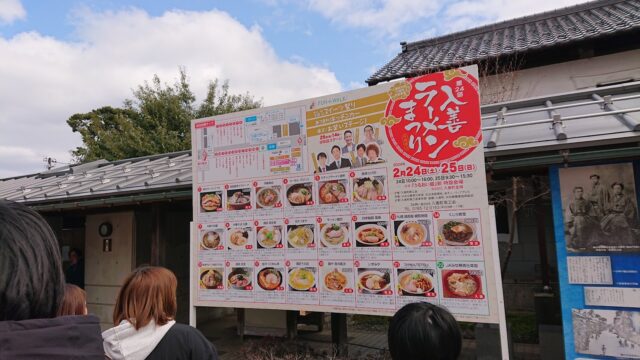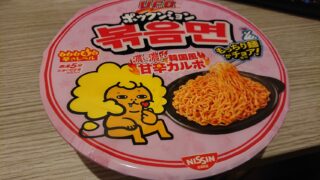週末料理 ジャーマンポテト風の何か Weekend cooking: something like German potatoes
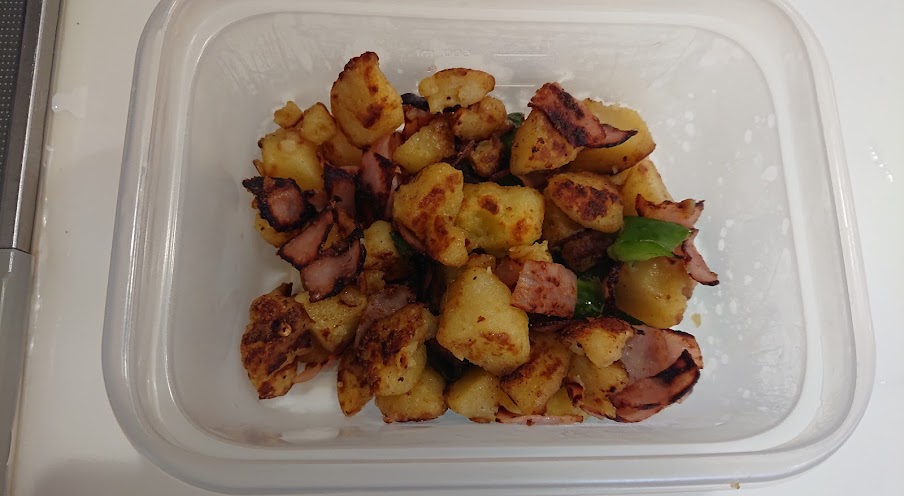
気合を入れて料理を作ろうとしたときに限って
材料が足りなかったり、なかったりします。
It’s always the times when I’m trying to cook something with enthusiasm that I don’t have enough ingredients or don’t have any.
今日はジャーマンポテトを作るつもりでしたが、
材料が揃わなかったのでいろいろ代用しました。
I was planning to make German potatoes today, but I didn’t have all the ingredients, so I used various substitutes.
目次
名前はジンジャーポテトと名付けます I’m going to call them ginger potatoes.
いつもはニンニクをいれますが、
ニンニクがちょうどなかったので
代わりにショウガを入れてみました。
I usually add garlic, but I didn’t have any garlic, so I used ginger instead.
他にも玉ねぎがないので
代わりに冷蔵庫にあったピーマンを使います。
I didn’t have any onions, so I used green peppers that I had in the fridge instead.
ベーコンもないのでハムです。
I didn’t have any bacon, so I used ham.
料理開始 Start cooking
作り方 How to make
材料を用意します。
Prepare the ingredients.
じゃがいも 3個
3 potatoes
ピーマン 1個
1 green pepper
ハム 4枚
4 slices of ham
調味料はショウガ、本だし、塩コショウです。
Seasonings are ginger, hon-dashi stock, salt and pepper.
量は適当です。
The amounts are just right.
ショウガをいれるということで、なんとなく本だしを入れることにしました。
Since I was adding ginger, I decided to add hon-dashi stock for some reason.
ショウガってなんか和風な気がします。
Ginger seems to have a Japanese feel to it.
ジャガイモは切って、耐熱ボウルに入れます。
Cut the potatoes and put them in a heat-resistant bowl.
水を少し加え、電子レンジで 600W、7分加熱します。
Add a little water and microwave at 600W for 7 minutes.
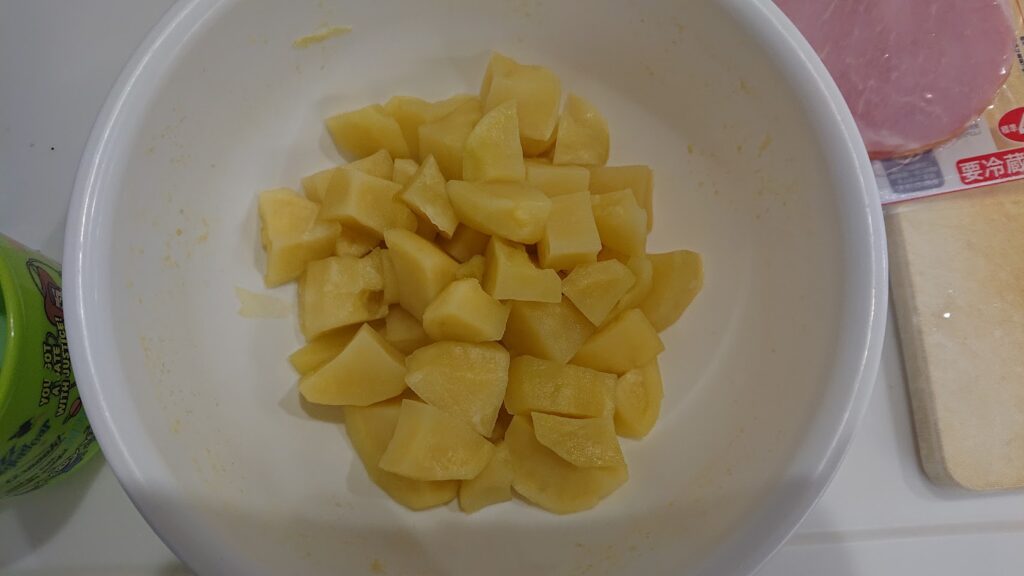
フライパンに油をひいて、ショウガを入れます。
Add oil to a frying pan and add ginger.
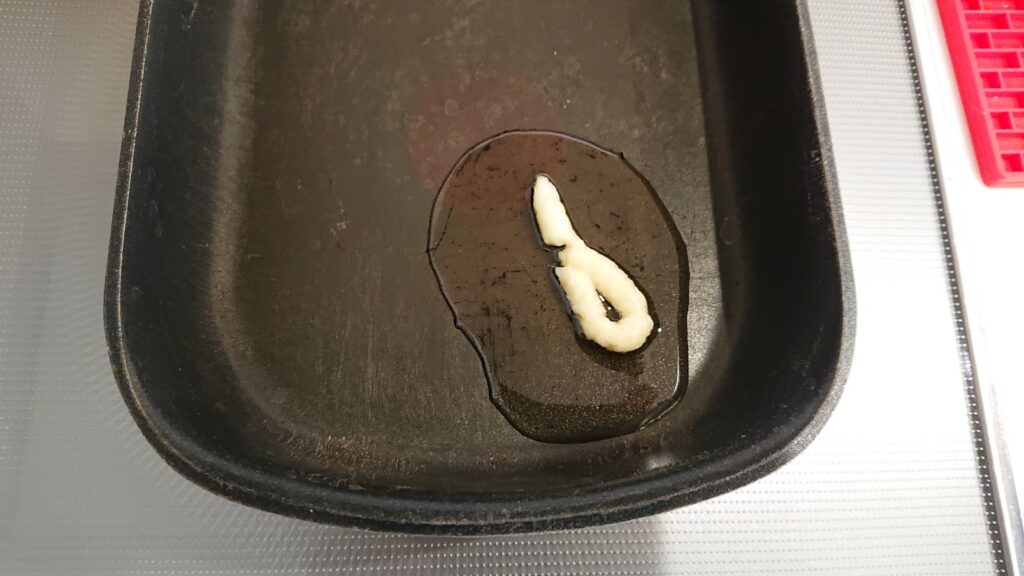
花粉症で鼻が詰まっているため、香りとかはわかりません。
My nose is stuffy from hay fever, so I can’t smell anything.
なんとなくいい感じと思ったら、材料をすべて投入します。
Once I think it tastes good, I add all the ingredients.
調味料も本だしがちょっと多いかなぐらいに入れました。
I used a little too much dashi stock for the seasonings.
塩コショウも適当です。
Salt and pepper are also appropriate.
なぜならば、花粉症で味がよくわからないからです。
This is because I can’t really taste things well because of my hay fever.
炒め終わったら完成です。
Once it’s done frying, it’s done.
ちょっと焦げましたが、この焦げも好きです。
It’s a little burnt, but I like this kind of burntness.

お味は As for the taste
ピーマンの緑が視覚的に入ることによって
おいしそうに見えます。
The green of the bell peppers makes it look delicious.
ジャーマンポテトの食感でおいしいです。
It has the texture of German potatoes and is delicious.
焼いたジャガイモの食感がすごい好きです。
I really love the texture of baked potatoes.
ショウガの感じはわかりませんでした。
I couldn’t taste the ginger.
鼻が詰まっているからかもしれません。
Maybe it’s because my nose is stuffy.
どちらかというとピーマンポテトでした。
It tasted more like green pepper potatoes.
自分的にはまぁまぁいいかなと思いました。
I thought it was pretty good.
Memo:Investigating the origin of ginger
There are many Japanese dishes that use ginger.
We use it in pork shogayaki, and as a condiment for tofu, udon, and soba.
Therefore, I think ginger is very Japanese.
I’m starting to wonder if that’s really the case, so I’d like to look into it.
Origin of ginger
It is said that ginger originates from India or Southeast Asia.
However, since it dates back to the hunting era, it has a long history and no wild species have been found, so the exact origin is unknown.
Environments where ginger grows well
It seems to grow well in warm places.
The optimum temperature is about 20°C.
Conversely, it may spoil at low temperatures.
Benefits of ginger
Ginger has been used as a medicine since ancient times.
Here are some of the main benefits of ginger.
Antibacterial
Anti-inflammatory
Promotes blood circulation
Promotes digestion
Not only is it a medicinal ingredient, but it also has the effect of warming the body in ordinary households, so it is often used in ginger tea when you have a cold or poor circulation.
Summary
It is not native to Japan, but I learned that its origin is not clear.
I think that India and Southeast Asia, which have warm temperatures and large areas, are where many different things grow.
I honestly respect it.









